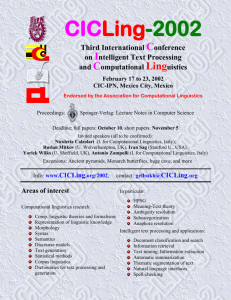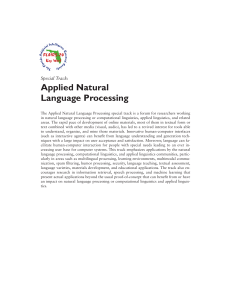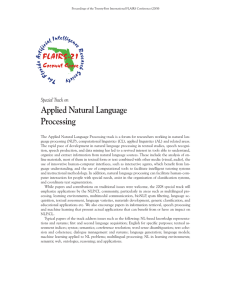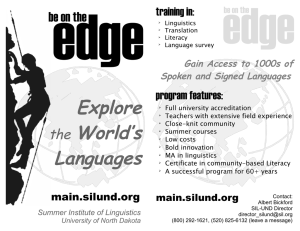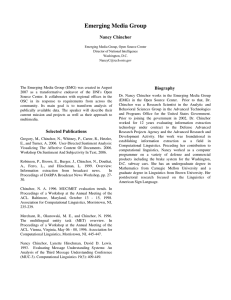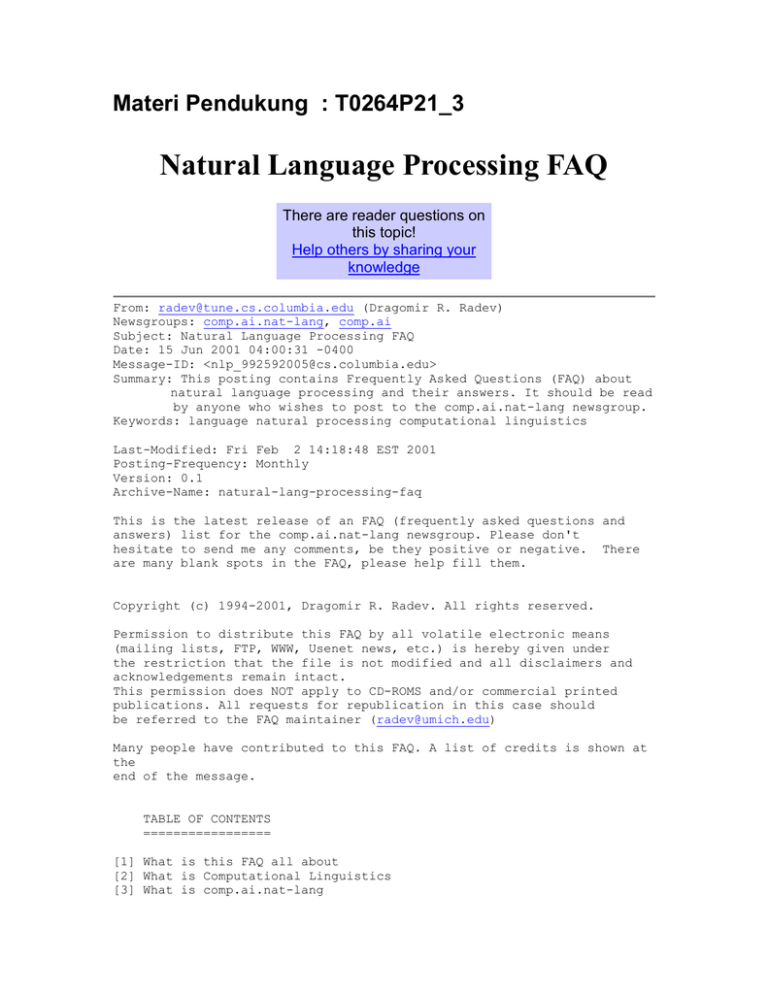
Materi Pendukung : T0264P21_3
Natural Language Processing FAQ
There are reader questions on
this topic!
Help others by sharing your
knowledge
From: radev@tune.cs.columbia.edu (Dragomir R. Radev)
Newsgroups: comp.ai.nat-lang, comp.ai
Subject: Natural Language Processing FAQ
Date: 15 Jun 2001 04:00:31 -0400
Message-ID: <nlp_992592005@cs.columbia.edu>
Summary: This posting contains Frequently Asked Questions (FAQ) about
natural language processing and their answers. It should be read
by anyone who wishes to post to the comp.ai.nat-lang newsgroup.
Keywords: language natural processing computational linguistics
Last-Modified: Fri Feb 2 14:18:48 EST 2001
Posting-Frequency: Monthly
Version: 0.1
Archive-Name: natural-lang-processing-faq
This is the latest release of an FAQ (frequently asked questions and
answers) list for the comp.ai.nat-lang newsgroup. Please don't
hesitate to send me any comments, be they positive or negative. There
are many blank spots in the FAQ, please help fill them.
Copyright (c) 1994-2001, Dragomir R. Radev. All rights reserved.
Permission to distribute this FAQ by all volatile electronic means
(mailing lists, FTP, WWW, Usenet news, etc.) is hereby given under
the restriction that the file is not modified and all disclaimers and
acknowledgements remain intact.
This permission does NOT apply to CD-ROMS and/or commercial printed
publications. All requests for republication in this case should
be referred to the FAQ maintainer (radev@umich.edu)
Many people have contributed to this FAQ. A list of credits is shown at
the
end of the message.
TABLE OF CONTENTS
=================
[1] What is this FAQ all about
[2] What is Computational Linguistics
[3] What is comp.ai.nat-lang
[4] How to get updates to this FAQ
[5] World-Wide Web resources.
[6] Which schools offer graduate programs in CL/NLP
[7] How to apply to graduate school in CL/NLP in the USA
[8] Organizations that are partly related to CL/NLP
[9] Major non-academic research laboratories
[10] What major publications exist in the field
[11] Bibliographies
[12] Electronic mailing lists
[13] Newsgroups
[14] Professional Organizations, Associations
[15] Major Conferences
[16] Evaluation Competitions
[17] How to join a mailing list
[18] How to obtain files by anonymous ftp
[19] FTP repositories
[20] What are some important books in NLP
[21] Encyclopedia of Artificial Intelligence
[22] Machine Translation
[23] What are the major accomplishments of the field
[24] Publishers
[25] Credits
Disclaimers and Notes
--------------------1. Please read this FAQ list before posting to comp.ai.nat-lang
2. The FAQ is a collection of materials, rather than a complete
reference.
Some of the information may be out of date, so please be careful
and
take everything with a grain of salt. The maintainer, Dragomir R.
Radev
(radev@umich.edu), doesn't assume any responsibility for wrong
information. The list of contributors to the FAQ appears at the end
of
this document.
3. Any comments, contributions, and corrections are more than welcome.
Please help make the FAQ really helpful and interesting.
---------------------------------------------------------------------------[1] What is this FAQ all about
This is an attempt to put together a list of frequently (and not so
frequently) asked questions about Natural Language Processing and their
answers. This document is in no way perfect or complete or 100%
accurate.
In no way should the maintainer be responsible for damage resulting
directly or indirectly from using information in this FAQ.
The FAQ originated from Mark Kantrowitz's FAQ on AI. Some questions in
the present document come directly from Mark's original FAQ (available
at http://www.faqs.org).
This FAQ is maintained by Dragomir R. Radev of the University of
Michigan. Please send me all your comments, suggestions, corrections,
additions, and such to my e-mail address:
radev@umich.edu
---------------------------------------------------------------------------[2] What is Computational Linguistics
Computational linguistics (CL) is a discipline between linguistics and
computer science which is concerned with the computational aspects of
the
human language faculty. It belongs to the cognitive sciences and
overlaps
with the field of artificial intelligence (AI), a branch of computer
science that is aiming at computational models of human cognition.
There are two components of CL: applied and theoretical.
The applied component of CL is more interested in the practical
outcome of modelling human language use. The goal is to create
software products that have some knowledge of human language. Such
products are urgently needed for improving human-machine interaction
since the main obstacle in the interaction beween human and computer
is one of communication. Today's computers do not understand our
language, and humans have difficulties understand the computer's
language, which does not correspond to the structure of human thought.
Natural language interfaces enable the user to communicate with the
computer in German, English or another human language. Some
applications
of such interfaces are database queries, information retrieval from
texts
and so-called expert systems. Current advances in recognition of
spoken
language improve the usability of many types of natural language
systems.
Communication with computers using spoken language will have a lasting
impact upon the work environment, opening up completely new areas of
application for information technology.
Although existing CL programs are far from achieving human ability,
they
have numerous possible applications. Even if the language the machine
understands and its domain of discourse are very restricted, the use of
human language can increase the acceptance of software and the
productivity
of its users.
Much older than communication problems between human beings and
machines
are those between people with different mother tongues. One of the
original goals of applied computational linguistics was fully automatic
translation between human languages. From bitter experience scientists
have realized that they are far from achieving this. Nevertheless,
computational linguists have created software systems which can
simplify
the work of human translators and clearly improve their productivity.
The future of applied computational linguistics will be determined by
the
growing need for user-friendly software. Even though the successful
simulation of human language competence is not to be expected in the
near
future, computational linguists have numerous immediate research goals
involving the design, realization and maintenance of systems which
facilitate everyday work, such as grammar checkers for word processing
programs.
Theoretical CL takes up issues in formal theories. It deals with
formal theories about the linguistic knowledge that a human needs for
generating and understanding language. Today these theories have
reached a degree of complexity that can only be managed by employing
computers. Computational linguists develop formal models simulating
aspects of the human language faculty and implement them as computer
programmes. These programmes constitute the basis for the evaluation
and further development of the theories. In addition to linguistic
theories, findings from cognitive psychology play a major role in
simulating linguistic competence. Within psychology, it is mainly the
area of psycholinguistics that examines the cognitive processes
constituting human language use.
The special attraction of computational linguistics lies in the
combination
of methods and strategies from the humanities, natural and behavioural
sciences, and engineering.
SEE ALSO: http://www.aclweb.org/archive/what.html which contains:
* Chapter 1 of Christopher D. Manning and Hinrich Sch|tze, 1999,
Foundations of Statistical Natural Language Processing, MIT Press,
Cambridge, MA.
* Chapter 1 of Daniel Jurafsky and James H. Martin, 2000, Speech and
Language Processing, Prentice Hall, Upper Saddle River, New Jersey.
---------------------------------------------------------------------------[3] What is comp.ai.nat-lang
Here follows the original charter for comp.ai.nat-lang.
Name:
comp.ai.nat-lang
Moderation:
This group will be unmoderated.
Purpose:
especially
To discuss issues relating to natural language,
computer-related issues from an AI viewpoint. The topics
that will be discussed in this group will concentrate on,
but
are not limited to, the following:
*
*
*
*
Natural Language Understanding
Natural Language Generation
Machine Translation
Dialogue and Discourse Systems
*
*
*
*
Natural Language Interfaces
Parsing
Computational Linguistics
Computer-Aided Language Learning
This group will avoid discussing issues that are more
properly
covered by other newsgroups. For example, speech
synthesis
should be discussed in comp.speech. However, due to the
interdisciplinary nature of the field, there may be
overlap in
material between other groups. To try to keep this to a
minimum, topics should pertain to computer-related
aspects
of natural language.
Rules of Decorum:
access to
Because of the unmoderated format, anyone with
this newsgroup will be able to post without review.
This is meant to encourage discussion of the topics.
Please refrain from "flames" or unnecessary
criticism
of a person's viewpoints or personality in a harsh
or insulting manner. Criticisms should constructive
and polite whenever possible.
----------------------------------------------------------------------[4] How to get updates to this FAQ
This FAQ is available currently from the following newsgroups:
comp.ai.nat-lang, comp.answers, comp.ai, and news.answers
It is posted once a month although updates are made less often.
The official archive of the above newsgroups is at MIT. You can get a
copy of the FAQ from
ftp://rtfm.mit.edu/pub/usenet-by-hierarchy/comp/ai/
Another major site with lots of FAQs (including this one) is
http://www.faqs.org
The current copy can also be retrieved from the following URL:
http://www.aclweb.org/faq/nlpfaq.txt
----------------------------------------------------------------------[5] World-Wide Web resources.
GENERAL RESOURCES AND CATALOGS
5.1.
The Association for Computational Linguistics site:
http://www.aclweb.org
The Association for Computational Linguistics is the major
international organization in the field.
5.2.
The ACL NLP/CL Universe:
http://www.aclweb.org/u/db/acl/
The largest index of Computational Linguistics and Natural
Language
Processing resources on the Web. It features a search engine
which should allow you to find specific NLP-related Web pages.
5.3.
The Computation and Language E-Print Archive
http://xxx.lanl.gov/archive/cs/
The Computation and Language E-Print Archive is a fully automated
electronic archive and distribution server for papers on
computational linguistics, natural-language processing,
speech processing, and related fields.
5.4.
The Survey of the State of the Art of Human Language Technology
http://www.cse.ogi.edu/CSLU/HLTsurvey/
This book surveys the state of the art of human language
technology. The goal of the survey is to provide an interested
reader
with an overview of the field---the main areas of work, the
capabilities and limitations of current technology, and the
technical
challenges that must be overcome to realize the vision of
graceful
human computer interaction using natural communication skills.
5.5.
The Linguistic Data Consortium
http://www.ldc.upenn.edu/
The Linguistic Data Consortium is an open consortium of
universities,
companies and government research laboratories. It creates,
collects
and distributes speech and text databases, lexicons, and other
resources for research and development purposes. The University
of
Pennsylvania is the LDC's host institution.
5.6. The Language Technology Helpdesk
http://www.ltg.ed.ac.uk/helpdesk/faq/index.html
Frequently-asked questions of the Human COmmunication Research
Centre at U. Edinburgh.
RESOURCES ON DIFFERENT TOPICS
5.7.
Head-Driven Phrase Structure Grammar
http://julius.ling.ohio-state.edu/HPSG/Hpsg.html
The HPSG offers current information relating to various aspects
of the grammar formalism and linguistic theory of Head-Driven
Phrase Structure Grammar, a constraint-based, lexicalist
approach to grammatical theory that seeks to model human
languages as systems of constraints on typed feature structures.
5.8.
Lexical Functional Grammar
http://clwww.essex.ac.uk/LFG/
This site provides access to information about various aspects
of the grammatical theory known as Lexical Functional Grammar
(LFG).
5.9.
Word Grammar
http://www.phon.ucl.ac.uk/home/Word-Grammar/wig-www.htm
This site houses publications on Word-Grammar and has some
information on the group and its meetings.
----------------------------------------------------------------------[6] Which schools offer graduate programs in CL/NLP
This list is, *of course*, completely preliminary. Please send me
information about other programs. I will try and get in touch with the
editors of the ACL guide to Graduate Programs in CL for more
information.
Universities are given in alphabetical order. If a certain university
is not included now and you feel it must be included, please send me
some information about it.
Australia:
Melbourne, University of
Microsoft Institute of Advanced Software Technology in association with
Macquarie University
Canada:
Montreal, University of
Ottawa, University of
Simon Fraser University
Toronto, University of
Waterloo, University of
Finland:
Helsinki, University of
France:
Paris 7, Jussieu, University of
Provence, University of
Germany:
Bonn, University of
Heidelberg, University of
Humboldt University, Berlin
Koblenz-Landau, University of
Munich, University of
Osnabrueck, University of
Saarland, University of the
Potsdam, University of
Stuttgart, University of
Tuebingen, University of
Italy:
Pisa, University of
Trento, University of
Japan:
Kyoto University
Korea:
Pohang University of Science and Technology, Pohang
Netherlands:
Amsterdam, University of
Groningen, University of
Nijmegen, University of
Tilburg, University of
Utrecht, University of
Sweden:
Goteborg (Gothenburg), University of
Skoevde, University of
Uppsala, University of
Switzerland:
Geneva, University of
Zurich, University of
UK:
Brighton, University of
Cambridge, University of
Durham, University of
Essex, University of
Edinburgh, University of
Sheffield, University of
Sussex, University of
University of Manchester Institute of Science and Technology
USA:
Brown University
Buffalo, SUNY at
California at Berkeley, University of
California at Los Angeles, University of
Carnegie-Mellon University
Columbia University
Cornell University
Delaware, University of
Duke University
Georgetown University
Georgia, University of
Georgia Institute of Technology
Harvard University
Indiana University
Information Sciences Institute (ISI) at the University of Southern
California
Johns Hopkins University
Massachusetts at Amherst, University of
Massachusetts Institute of Technology
Michigan, University of
New Mexico State University
New York University
Ohio State University
Pennsylvania, University of
Rochester, University of
Southern California, University of
Stanford University
SUNY, Buffalo
Utah, University of
Wisconsin - Milwaukee, University of
Yale University
----------------------------------------------------------------------[7]How to apply to graduate school in CL/NLP in the USA
Usually, the best timetable is as follows (given that M is the month
when your studies would start, usually, in September)
M - 24 : Try to clarify your interests: is it really NLP
that you are interested in? What possible
subfields might be of interest to you? ...etc.
Remember: 5 years working in an area you are
not interested in will be a very painful
experience.
M - 18 : Read publications in the area of your interest
in order to discover the best places for
you. Pay close attention to the specific fields of
research: which professors are most active in those
fields, and which institutions.
Remember: Unless you are familiar with the most
current research, you will not be able
to find the best place for you.
M - 18 : Go to your local library and consult some of the
available directories (see [3-3]) - write down
as much information as you can about some
15-25 universities. These universities form your
preliminary list.
Remember: There are some 100 universities in the
USA offering NLP/CL programs. Some of them
will be more attractive to you than others.
M - 18 : Talk to your advisers at school, talk to other
students, post questions on the Internet, visit
departmental Web sites.
This way you will get advice on a few more universities that you might have skipped until this moment.
Remember: Others have faced what you are going
through. Use their experience.
M - 15 : Send letters to the universities that you have
on your preliminary list. Make sure you indicate
when do you want to start, what degree (MA, MS,
Ph.D.) you are interested in, whether or not
you will be applying for financial aid, whether
you will need some special visa...
Remember: Ask for all the information that you
need; give them all the information they'd
need to satisfy your request.
M - 12 : Read carefully the information that you have
received from the universities. Shorten your list
of places to the number that you will eventually
apply to (usually 5-8 is a good number).
Remember: Make sure you include both your best choice
schools and some places where you are almost
certain of getting accepted.
M - 10 : Fill in all the forms that are sent to you,
ask your professors to send reference letters to
the schools directly.
Remember: Professors will probably be very busy.
Give them the reference forms
as early as possible and make sure you
specify a reasonable time for them to fill
them in and send them out.
M - 10 : (or earlier) - take the necessary tests (GRE,
TOEFL, or others) that the schools want. Make sure
you tell the testing service which universities
you want them to send your scores to.
Remember: Time yourself through several practice
tests. The GRE General test, for example,
is more about mastery of timing than
knowledge.
M - 9 : (approximately) - mail your forms to the schools,
preferably 2-3 weeks before the deadlines.
Remember: You don't want your applications to get
there
at the same time as everyone else. Give the
admissions committee some extra time to
review your application.
M - 6 : usually six months before the beginning of the
semester
that you are applying for, you will get a letter
saying whether you have been accepted.
Remember: Usually, thick letters, e-mails, and
telegrams
mean acceptance. Thin one-sheet letters will
most likely be disappointing for you.
M - 5 : now, you have been accepted to a few schools. Go back
to the same resources that you used when you were
deciding where to apply (journals, catalogs, directories, professors, etc.). Ask the schools that accepted
you to fly you in for a visit (many will do this).
Remember: Don't forget non-academic factors such as
location, financial aid, the atmosphere in
the department, etc.
-----------------------------------------------------------------------
[8] Organizations that are partly related to CL/NLP
International Assoc of MT (IAMT) and its daughters AMTA, EAMT, AAMT
http://www.eamt.org
http://www.isi.edu/natural-language/organizations/amta/
http://www.jeida.or.jp/aamt/index-e.html
ACM SIGIR (Special Interest Group in Information Retrieval)
http://www.sigir.org
ICSLP
http://www.icspl.org
ACL SIGS (SIGDAT, SIGDIAL, SIGGEN, SIGLEX, SIGMEDIA, SIGMOL, SIGNLL,
SIGPARSE, SIGPHON, SIGSEM)
http://www.aclweb.org/information.html
----------------------------------------------------------------------[9] Major non-academic research laboratories
AT&T Labs - Research
BBN Systems and Technologies Corporation
DFKI (German research center for AI)
General Electric R&D
IRST, Italy
IBM T.J. Watson Research, NY
Lucent Technologies Bell Labs, Murray Hill, NJ
Microsoft Research, Redmond, WA
MITRE
NEC Corporation
SRI International, Menlo Park, CA
SRI International, Cambridge, UK
Xerox, Palo Alto, CA
XRCE, Grenoble, France
----------------------------------------------------------------------[10] What major publications exist in the field
10.1. COMPUTATIONAL LINGUISTICS
Computational Linguistics is the only publication devoted exclusively
to the design and analysis of natural language processing
systems. From this unique quarterly, university and industry
linguists, computational linguists, artificial intelligence (AI)
investigators, cognitive scientists, speech specialists, and
philosophers get information about computational aspects of research
on language, linguistics, and the psychology of language processing
and performance.
Published by The MIT Press for: The Association for Computational
Linguistics.
URL: http://mitpress.mit.edu/journal-home.tcl?issn=08912017
10.2. JOURNAL OF NATURAL LANGUAGE ENGINEERING (JNLE)
Editors:
Dr B. K. Boguraev, IBM Thomas J. Watson Research Center, New York, USA
Professor Roberto Garigliano, University of Durham, UK
Dr John I. Tait, University of Sunderland, UK
Published: March, June, September and December. ISSN:1351-3249.
Natural Language Engineering is an international journal designed
to meet the needs of professionals and researchers working in all
areas of computerised language processing, whether from the
perspective of theoretical or descriptive linguistics, lexicology,
computer science or engineering. Its principal aim is to bridge the
gap between traditional computational linguistics research and the
implementation of practical applications with potential real-world
use. As well as publishing research articles on a broad range of
topics &ndash; from text analysis, machine translation and speech
generation and synthesis to integrated systems and multi modal
interfaces &ndash; the journal also publishes book reviews. Its aim is
to provide the essential link between industry and the academic
community
10.3. COMPUTER SPEECH & LANGUAGE (CS&L)
Editors: Prof. S.J. Young & Dr. S.E. Levinson
Send manuscripts (worldwide apart from the Americas) to:
Prof. Steve Young, Cambridge University Engineering Dept.,
Trumpington Street, Cambridge, CB2 1PZ, England.
Email: sjy@eng.cam.ac.uk
Send manuscripts (from the Americas) to:
Dr. Steve Levinson, Head Linguistics Reseach,
AT&T Bell Laboratories, 600 Mountain Ave.,
Murray Hill, New Jersey 07974. USA.
Email: sel@research.att.com
US Subscription rates are $170, with a personal rate of $75.
CS&L is published 4 times per year.
The address for subscription orders is:
Harcourt Brace and Company Limited,
High Street, Foots Cray,
Sidcup, Kent, DA14 SHP. England.
10.4. MACHINE TRANSLATION
Published 4 times annually. ISSN 0922-6567.
Subscriptions: Institutions $141 plus $16 postage; Individuals $55
(members of ACL $46).
Kluwer Academic Publishers, PO Box 322, 3300 AH Dordrecht, The
Netherlands, or Kluwer Academic Publishers, PO Box 358, Accord
Station, Hingham, MA 02018-0358.
10.5. SPEECH TECHNOLOGY
Published quarterly, since 1981.
Media Dimensions, New York, NY, USA
10.6. NATURAL LANGUAGE & LINGUISTIC THEORY (NALA)
Published quarterly. ISSN 0167-806X
Subscriptions: Individual $59,-/Dfl.156,-; Institutional $200,/Dfl.383,including p&h. Kluwer Academic Publishers
USA: Order Dept, Box 358, Accord Station, Hingham, MA 02018-0358. Phone
(617) 871-6600; Fax (617) 871-6528; E-mail: Kluwer@world.std.com
Other: P.O.Box 322, 3300 AH Dordrecht, The Netherlands. Phone (31) 78
524400; Fax (31) 78 183273; Telex: kadc nl; E-mail:
vanderLinden@wkap.nl
10.7. MIND AND LANGUAGE
Editors: Cotheart, Davies, Guttenplan, Harris, Humphreys, Leslie,
Smith, Wilson.
4 times annually
Blackwell Publishers, Oxford, UK.
10.8. JOURNAL OF LOGIC, LANGUAGE AND INFORMATION
Editor: Peter Gardenfors
----------------------------------------------------------------------[11] Bibliographies
NLP/CL:
For information on a fairly complete bibliography of computational
linguistics and natural language processing work from the 1980s,
send
mail to clbib@csli.stanford.edu with the subject HELP.
The CSLI linguistics bibliography contains 3,300 entries in
bib/tib/refer format. The bibliography is heavily slanted towards
phonetics and phonology but also includes a fair amount of
computational morphology, syntax, semantics, and psycholinguistics.
The bibliography can be used with James Alexander's tib
bibliography system, which is available from minos.inria.fr
[128.93.39.5] among other places. The bibliography itself is
available
by anonymous ftp from
ftp://csli.stanford.edu/pub/bibliography/
Contributions are welcome, but should be in tib format.
For more information, contact Andras Kornai
<kornai@csli.stanford.edu>
NLG:
Robert Dale's Natural Language Generation (NLG) bibliography is
available by anonymous ftp from
scott.cogsci.ed.ac.uk:/pub/nlg/ [129.215.144.3]
Note that it is formatted for A4 paper. Stick in a line
.94 .94 scale
after the %! line to print on 8.5 x 11 paper. For further
information,
write to Robert Dale, University of Edinburgh, Centre for Cognitive
Science, 2 Buccleuch Place, Edinburgh EH8 9LW Scotland, or
<R.Dale@edinburgh.ac.uk> or <rdale@microsoft.com>.
Mark Kantrowitz's Natural Language Generation (NLG) bibliography is
available by anonymous ftp from
ftp://ftp.cs.cmu.edu/user/ai/areas/nlp/nlg/bib/mk/
[128.2.206.173]
In addition to the tech report, the BibTeX file containing the
bibliography is also available. The bibliography contains more than
1,200 entries. A searchable index to the bibliography is
available via the URL
http://liinwww.ira.uka.de/bibliography/Ai/nlg.html
Additions and corrections should be sent to mkant@cs.cmu.edu.
----------------------------------------------------------------------[12] Electronic mailing lists
(This section is out of date - should be fixed for next release.)
Information Retrieval:
irlist <ir-l%uccvma.bitnet@vm1.nodak.edu>
Natural Language and Knowledge Representation (moderated):
nl-kr@cs.rpi.edu (formerly nl-kr@cs.rochester.edu)
Gatewayed to the newsgroup comp.ai.nlang-know-rep.
Natural Language Generation:
siggen@black.bgu.ac.il
LFG (Lexical-Functional Grammar):
http://linguistlist.org/subscribing/sub-lfg.html
Parsing:
sigparse@cs.cmu.edu
Statistics, Natural Language, and Computing:
empiricists@csli.stanford.edu
Colibri (weekly update on Conferences, Seminars, Jobs and Shareware in
NLP and speech)
colibri-request@let.ruu.nl
Dependency Grammar
dg@ai.uga.edu
Prosody:
listserv@purccvm.bitnet
TEI:
tei-l
Text Analysis and Natural Language Applications:
SCHOLAR@CUNYVM.BITNET
Text Corpora:
corpora-request@nora.hd.uib.no
Speech production and perception:
foNETiks <fonetiks@mailbase.ac.uk>
LN:
ln@frmop11.bitnet
Linguist:
linguist@tamvm1.tamu.edu
ELSNET:
elsnet-list@cogsci.ed.ac.uk
Eastern (European) Language Engineering list:
to join, send mail to poul_andersen@eurokom.ie
Preprint archive mailing list
For further information about (among other topics) submission of
papers to
the server, subscribing or canceling your subscription, requesting
full
text of any of the papers above, retrieving macro files for these
papers,
searching past listings, or submitting comments to the server
operators,
send a message:
To: CMP-LG@XXX.LANL.GOV
Subject: help
----------------------------------------------------------------------[13] Newsgroups
alt.usage.english
comp.ai.nat-lang
comp.ai.nlang-know-rep
Representation.
English grammar, word usages, and related
topics.
Natural language processing by computers.
Natural Language and Knowledge
(Moderated)
Research & applications in speech science &
technology.
sci.lang
Natural languages, communication, etc.
alt.etext
Electronic texts.
comp.text.sgml
ISO 8879 SGML structured documents markup
languages
comp.theory.info-retrieval Information Retrieval topics. (Moderated)
comp.ai.doc-analysis.misc General document understanding technologies
comp.internet.library
Discussing electronic libraries. (Moderated)
comp.speech
----------------------------------------------------------------------[14] Professional Organizations, Associations
ASSOCIATION FOR COMP

